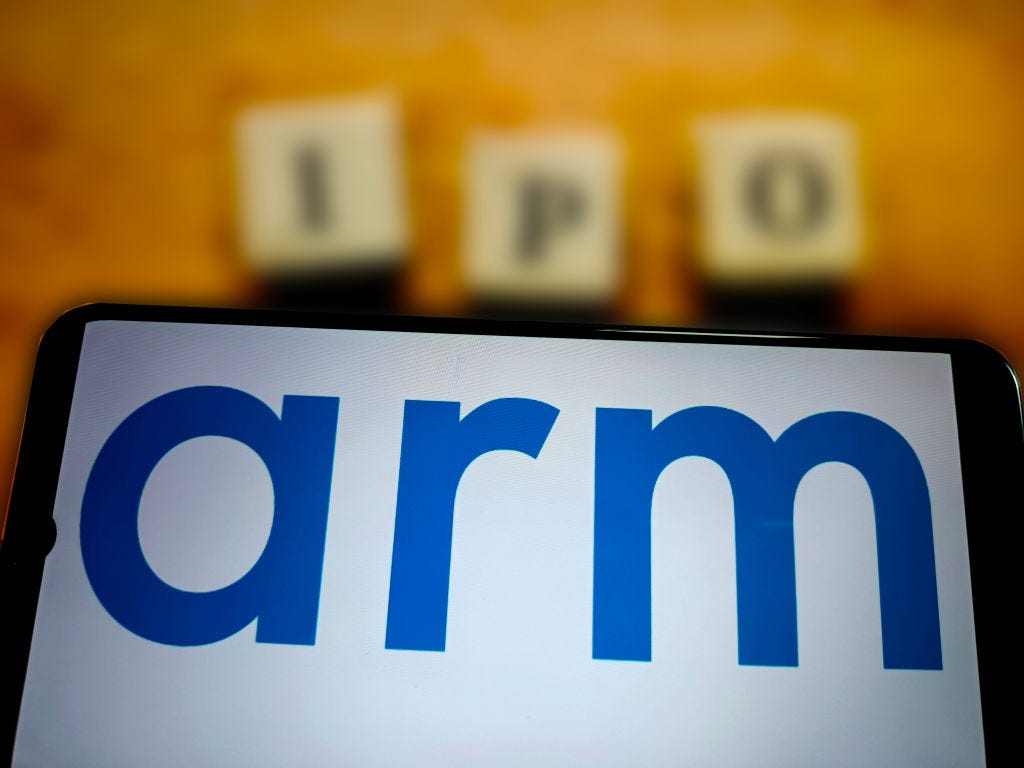Arm floats
The business news that matters
Hello and welcome to the latest edition of Off to Lunch…
Today is a big day in the history of Arm, the Cambridge-based chip designer. Shares in Arm will start trading in New York after the company’s IPO.
Shares in Arm have been priced at $51 each in the float, which was at the top end of expectations. This values the company at around $54.5 billion (£43.7 billion) and means that Softbank will raise about $4.9 billion from selling shares in Arm.
The IPO comes seven years after Softbank, the Japanese investor led by Masa Son, controversially bought Arm for £24.3 billion, taking one of the UK’s most successful technology companies into foreign ownership.
The price of the IPO means that Softbank will make a profit on its investment. However, the valuation of Arm is below the $64 billion price tag that Softbank put on the company in an internal transaction last month. Softbank will still own 90 per cent of Arm after the float.
There has been much soul-searching in the City about Softbank choosing to list Arm in New York rather than London. But the demand to buy shares in Arm (the float was reportedly five-times oversubscribed) is a reminder of the positive side of this story - a world-class technology company was built in the UK.
The IPO - and how the shares perform today - is also an important moment for financial markets in general. This is the biggest IPO around the world since Rivian, the electric truck-maker, two years ago. Arm will be a test of the market’s demand for tech stocks.
For what it’s worth, Rivian has not had a great time since it listed. As the Google Finance graph below shows, shares in Rivian are down more than 80 per cent since the float and it is now valued at just over $20 billion…
Arm was founded in Cambridge in 1990. For more on the history of the company check-out our Business Studies podcast episode about it, which covers everything you need to know and more. It features an interview with James Ashton, author of a superb book on Arm called The Everything Blueprint: The Microchip Design that Changed the World. The episode looks at what lessons the UK can learn from the success of Arm and why artificial intelligence and data centres are key to the company’s future. You can find the podcast episode here, James’s book here and Softbank’s filling about the float with the US Securities and Exchange Commission (which includes lots of interesting details) here
Other stories that matter…
1. China has accused the European Union of a “naked protectionist act” after it launched an investigation into the subsidies that Beijing is providing for the electric car industry. The investigation could lead to tariffs being put on Chinese-made electric cars, which are enjoying a significant rise in sales and emerging as a threat to European carmakers. You can find more about this in a story by Politico here. Sticking with electric vehicles, the promising UK company Wayve has said that it has developed a self-driving system that explains its actions to passengers. Story by the Financial Times here
2. The John Lewis Partnership has said that a turnaround of the retail business will take two years longer than previously thought. The Partnership, which owns John Lewis and Waitrose, said this was because of “inflationary pressures and greater than expected investment requirements for our transformation”. The retailer made the comments in its half-year results, which showed a pre-tax loss of £99.2 million. You can find the results here and an analysis by Bloomberg’s Andrea Felsted here, which says that the John Lewis Partnership should take lessons from the turnaround of Marks & Spencer as they “battle for the soul of Middle England”.
3. The resignation of Bernard Looney as chief executive of BP due to personal relationships with colleagues gives the UK business community “an awful lot to ponder”, according to Patrick Hosking in The Times. This includes headhunters reconsidering what character traits make a good business leader, he adds in his column, which you can read here
4. Rishi Sunak and Jeremy Hunt are considering scrapping the second phase of HS2 - the Birmingham to Manchester link - due to spiralling costs. We have heard this story before, but The Independent says it has seen new cost estimates that show £34 billion could be saved. Story here
5. Some interesting news about the economics of the podcast industry: The Economist is going to put its podcasts behind a paywall. Exclusive by Axios here
And finally…
The oldest lido in the UK - Cleveland Pools in Bath - has reopened this week. Cleveland Pools first opened in 1815 but closed in 1984 amid competition from indoor swimming pools. It became a trout farm and then a private residence but the National Lottery, the government and Historic England funded a refurbishment and modernisation of the lido. You can find out more about Cleveland Pools here. During the warm weather this summer my family and I found ourselves enjoying outdoor swimming pools across the UK - including Saltdean Lido in Brighton, which is also being restored, Brockwell Lido in London and the heated Shap Swimming Pool in Cumbria. For a guide to some of the best outdoor swimming pools in the UK check-out TimeOut’s list here
Thanks for reading. If you enjoy Off to Lunch then please share it with others and spread the word. If this newsletter was shared with you then please sign-up below to become a member, get Off to Lunch sent directly to your inbox, and contribute to the work of Off to Lunch
Best
Graham




